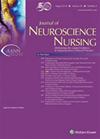脑肿瘤患者在等待手术期间的恢复能力
IF 2
3区 医学
Q4 CLINICAL NEUROLOGY
引用次数: 0
摘要
背景:适应力是指患者在被诊断患有某种疾病时有效适应的能力。在等待脑肿瘤手术期间,患者经常因脑肿瘤相关症状而感到不确定,导致抑郁症状,身体残疾,生活质量下降。复原力研究广泛地在术后阶段进行,而对术前阶段的了解有限。这项研究旨在确定等待脑肿瘤手术时恢复力的预测因素。方法:这项横断面预测研究包括100名18岁及以上的参与者,他们被诊断为脑肿瘤,并在2022年8月至2023年2月期间在曼谷一家三级医院的门诊等待脑肿瘤手术。运用多元线性回归检验心理弹性的预测因子。结果:以女性居多(77%),平均年龄52.71(13.17)岁。脑膜瘤是最常见的脑肿瘤类型(38%)。脑肿瘤诊断至术前等待时间中位数为18(3 ~ 1464)天。症状严重程度、社会支持、治疗方案能解释脑肿瘤等待手术患者心理弹性方差的37.3% (F = 19.077, P < 0.01, r2 = 0.373,调整后r2 = 0.354)。结论:适应能力是脑肿瘤患者应对生活中不确定性事件的重要技能。术前阶段需要评估身体和精神肿瘤相关症状,并将护理人员作为护理的一部分,以提高等待脑肿瘤手术的患者的恢复能力。本文章由计算机程序翻译,如有差异,请以英文原文为准。
Resilience of Patients With Brain Tumor While Awaiting Surgery
BACKGROUND: Resilience is the ability of patients to adapt effectively when given a diagnosis of an illness. While awaiting brain tumor surgery, patients often experience uncertainty from brain tumor–related symptoms resulting in inducing depressive symptoms, having physical disability, and reducing quality of life. Resilience studies have been widely conducted in the postoperative phase with a limited knowledge on the preoperative phase. This study aimed to identify predictors of resilience while awaiting brain tumor surgery. METHODS: This cross-sectional predictive study includes 100 participants 18 years and older, with diagnosis of brain tumors, and waiting for brain tumor surgery at the outpatient department of 1 tertiary hospital in Bangkok between August 2022 and February 2023. Multiple linear regression was used to examine the predictors of resilience. RESULTS: Most of the sample (77%) were female with a mean age of 52.71 (13.17) years. The most common type of brain tumor was meningioma (38%). The median waiting time since brain tumor diagnosis until the date of preadmission for operation was 18 (3-1464) days. Symptom severity, social support, and treatment plan were able to explain 37.3% of the variance of resilience in patients awaiting brain tumor surgery (F = 19.077, P < .01, R
2 = 0.373, adjusted R
2 = 0.354). CONCLUSION: Resilience is an important skill for patients with brain tumor to manage uncertainty events that occur in their lives. The preoperation phase needs to assess both physical and mental tumor-related symptoms, and include caregivers as part of the care, to promote resilience skill for patients awaiting brain tumor surgery.
求助全文
通过发布文献求助,成功后即可免费获取论文全文。
去求助
来源期刊

Journal of Neuroscience Nursing
CLINICAL NEUROLOGY-NURSING
CiteScore
3.10
自引率
30.40%
发文量
110
审稿时长
>12 weeks
期刊介绍:
The Journal of Neuroscience Nursing (JNN), the official journal of the American Association of Neuroscience Nurses, contains original articles on advances in neurosurgical and neurological techniques as they affect nursing care, theory and research, as well as commentary on the roles of the neuroscience nurse in the health care team.
The journal provides information to nurses and health care professionals working in diverse areas of neuroscience patient care such as multi-specialty and neuroscience intensive care units, general neuroscience units, combination units (neuro/ortho, neuromuscular/rehabilitation, neuropsychiatry, neurogerontology), rehabilitation units, medical-surgical units, pediatric units, emergency and trauma departments, and surgery. The information is applicable to professionals working in clinical, research, administrative, and educational settings.
 求助内容:
求助内容: 应助结果提醒方式:
应助结果提醒方式:


